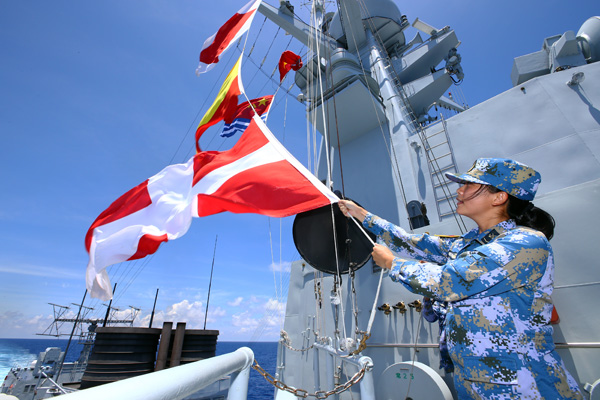New arbitration cases 'unlikely'
Updated: 2016-07-19 06:47
By AN BAIJIE/CUI SHOUFENG(China Daily)
|
|||||||||
 |
|
A sailor raises signal flags on the Chinese Navy missile destroyer Hefei during a military exercise off the Xisha Islands on the South China Sea on July 8, 2016. [Photo by ZHA CHUNMING/CHINA DAILY] |
Political discussion to solve disputes is more effective, experts at seminar say
Most Southeast Asian countries are not likely to follow Manila's suit of unilaterally initiating an arbitration case against China, experts said on Monday at a think tank seminar on the South China Sea issue.
Zhao Qizheng, former minister of China's State Council Information Office, said in his keynote speech that it would be the most practical choice for ASEAN members to focus on cooperation with China.
"The disputes in the South China Sea are only a problem between China and some of the ASEAN member states, not all of them," he said.
Oh Ei Sun, a senior fellow at the Institute of Defence and Strategic Studies at Nanyang Technological University in Singapore, said most ASEAN countries concerned with South China Sea issues are likely to continue with their traditional call for nonviolent resolution of conflicts and adherence to international law.
"Vietnam is unlikely to institute a similar case, as it always had a unique way of resolving differences with China, sometimes through party-to-party channels," he said.
Mentioning that China and many ASEAN members are working together on infrastructure projects, he called on closer exchanges apart from economic deals.
"What we would not like to see is the escalation of an arms race in this part of the world. If we at least temporarily set aside the disputes, the relationship between many ASEAN countries and China would be more cordial. We do a lot of business together," he said.
Katherine Hui-Yi Tseng, an associate research fellow in the East Asian Institute, National University of Singapore, said that other ASEAN members have adopted a "wait and see posture" on how China and the Philippines solve the issue.
"They will not undertake actions in near future, because this award is actually unhelpful to their claim (all land features are rocks with no entitlement of 200 nautical miles)," she told China Daily by e-mail before the seminar.
"In the near future, these ASEAN countries are not going to launch litigation against China. Such an announcement may be more like a water-testing tactic, hoping to extract more benefits from China," she said.
Wang Yuzhu, a researcher of China-ASEAN studies at the Chinese Academy of Social Sciences, said that many China-proposed projects, including the Belt and Road Initiative and the Asian Infrastructure Investment Bank, could benefit Southeast Asia countries.
"At present, if you work with China, you are better off. I think the political leaders know it. They exaggerate the South China Sea issue just because they have other political calculations. They forget the benefit of the common people." he said.
During the seminar, a Chinese researcher denied the accusation that China is trying to tear up the unity of Association of Southeast Asian Nations through winning support from countries including Cambodia and the Laos in the China-Philippine maritime disputes.
Fan Jishe, a senior researcher at the Institute of American Studies, Chinese Academy of Social Sciences, said that the US wants to mobilize most ASEAN countries to deal with China in very negative terms, which he said is quite similar to the security architecture during the Cold War.
"It will tear apart the regional integrity formulated in the past decades, and Southeast Asian countries may be forced to take sides. That's not in ASEAN countries' interests," he said.
Related Stories
The world needs the voice of youth after South China Sea ruling 2016-07-18 22:56
China's Air Force flags regular patrols in South China Sea 2016-07-18 20:06
Alert issued for PLA drills in the South China Sea 2016-07-18 14:14
Commercial fish cultured at farm in Meiji Reef of South China Sea 2016-07-18 10:03
Navy chiefs set for fresh talks on South China Sea 2016-07-18 09:41
Stance on South China Sea backed at ASEM meet 2016-07-18 09:41
Today's Top News
Turkey's failed coup to consolidate Erdogan's power
IMF to cut global growth forecasts after Brexit vote
IS: Refugee attacker in Germany one of its fighters
Did Melania Trump plagiarize from Michelle Obama?
26 die after tour bus catches fire in Taiwan
Former Turkish air force chief confesses to plot coup
Arrests hit 6,000 as Turkey cracks down on army
Chinese tourism to France will 'drop' after attack
Hot Topics
Lunar probe , China growth forecasts, Emission rules get tougher, China seen through 'colored lens', International board,
Editor's Picks

|

|

|

|

|

|







